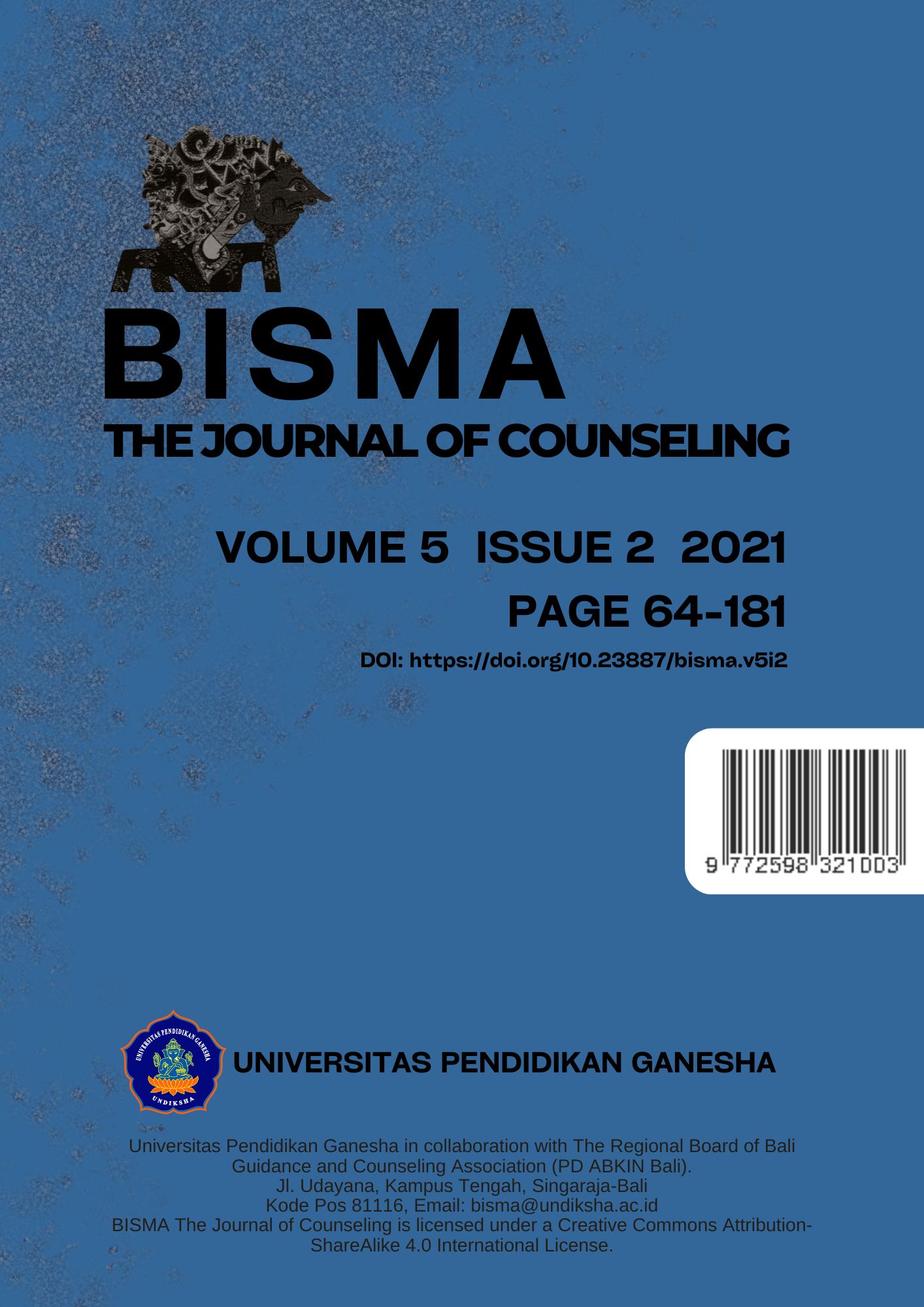Development of Responsibility Character Instruments for Junior High School Students
DOI:
https://doi.org/10.23887/bisma.v5i2.37819Keywords:
Responsibility character, measurement instrument, guidance and counseling.Abstract
The aims of this study is to produce an instrument for measuring the character of responsibility in students. The type of research is research and development. In this study there are 10 steps that must be taken, namely: (1) setting the test objectives; (2) analysis of books and other learning resources, (3) making grids; (4) writing questions; (5) examine the questions (concept validation); (6) revision or improvement of questions; (7) limited test reproduction; (8) test trials (for empirical validation); (9) analysis of test results (validity test); and (10) assemble the questions into tests. The validation test was carried out by 5 counseling guidance experts consisting of 3 counseling guidance lecturers and 2 counseling guidance teachers. The results of CVI and CVR data analysis were +1, which means 45 statements were stated as relevant. Based on the empirical validation test with product moment, it is known that rhit > rtab so that 45 statements can be declared valid. Furthermore, the results of the reliability test using the cronbach alpha technique obtained r11 = 1.0 with a very high category.
References
Dantes, N. (2019). Pengembangan Tes Non-Kognitif. Singaraja: DAN’s Learning Center.
Hanim, W., Mamesah, M., & Anzelyna, R. R. (2018). Pengaruh Bimbingan Klasikal dengan Model Project Based Learning untuk Meningkatkan Tanggung Jawab Siswa. Insight: Jurnal Bimbingan Konseling, 7(1), 56–71. https://doi.org/10.21009/insight.071.05
Hendryadi, H. (2017). Validitas Isi: Tahap Awal Pengembangan Kuesioner. Jurnal Riset Manajemen Dan Bisnis (JRMB) Fakultas Ekonomi UNIAT, 2(2), 169–178. https://doi.org/10.36226/jrmb.v2i2.47
Kemendikbud. (2018). Permendikbud RI No 20 Tahun 2018. Permendikbud Nomor 20 Tahun 2018 Tentang Penguatan Pendidikan Karakter Pada Satuan Pendidikan Formal, 3.
Koyan, I. W. (2012). Statistik Pendidikan (Teknik Analisis Data Kuantitatif) (Pertama, A). Singaraja: Universitas Pendidikan Ganesha Press.
Kurniasih, I. & B. S. (2017). Pendidikan Karakter (Internalisasi dan Metode Pembelajaran di Sekolah). Yogyakarta: Kata Pena.
Lawshe, C. H. (1975). a Quantitative Approach To Content Validity. Personnel Psychology, 28(4), 563–575. https://doi.org/10.1111/j.1744-6570.1975.tb01393.x
Muljono, P. (2002). Penyusunan dan Pengembangan Instrumen Penelitian. Penyusunan Dan Pengembangan Instrumen Penelitian. Retrieved from https://repository.ipb.ac.id/jspui/bitstream/123456789/34011/1/KPMpjm-makalah2-penyusunan....pdf
Nuroniyah, S. (2018). Pengembangan instrumen pengukuran sikap tanggung jawab siswa madrasah aliyah. Wiyata Dharma: Jurnal Penelitian Dan Evaluasi Pendidikan, 6(2), 134–141. https://doi.org/10.30738/wd.v6i2.3392
Oktaviani, C. (2018). Metode Penelitian. Retrieved from https://eprints.uny.ac.id/63123/6/BAB III_Skripsi_Claudya Oktaviani_14520241005.pdf
Primayanti, N. H., Antari, N. M., & Dantes, N. (2014). Penerapan Konseling Eksistensial Humanistik Melalui Konseling Kelompok Untuk Meningkatkan Tanggung Jawab Belajar Siswa Kelas VIII B SMP Negeri 3 Singaraja. Undiksa Jurusan Bimbingan Konseling, 2(1). Retrieved from https://ejournal.undiksha.ac.id/index.php/JJBK/article/viewFile/3732/2991
Purwadi, Y. (2016). IMPLEMENTASI METODE BERMAIN PERAN, DISKUSI DAN PENUGASAN UNTUK PENINGKATAN HASIL BELAJAR KEWIRAUSAHAAN DAN SIKAP TANGGUNG JAWAB SISWA KELAS XI DI SMK NEGERI 3 METRO TAHUN PELAJARAN 2011/2012. PROMOSI (Jurnal Pendidikan Ekonomi), 4(1), 84–94. https://doi.org/10.24127/ja.v4i1.480
Retnowati, A. (2019). Pengembangan instrumen penilaian sikap tanggung jawab siswa SMP. Wiyata Dharma: Jurnal Penelitian Dan Evaluasi Pendidikan, 7(1), 76–84. https://doi.org/10.30738/wd.v7i1.3591
Syafitri, R. (2017). Meningkatkan Tanggung Jawab Belajar Melalui Strategi Giving Questions and Getting Answers Pada Siswa. Jurnal Penelitian Dan Pengembangan Pendidikan, 1(2), 57–63. https://doi.org/10.23887/jppp.v1i2.12623
Yuliyanto, A., Fadriyah, A., Yeli, K. P., & Wulandari, H. (2018). PENDEKATAN SAINTIFIK UNTUK MENGEMBANGKAN KARAKTER DISIPLIN DAN TANGGUNG JAWAB SISWA SEKOLAH DASAR. Metodik Didaktik, 13(2), 87–98. https://doi.org/10.17509/md.v13i2.9307








